-
 Bitcoin
Bitcoin $85,697.3844
1.57% -
 Ethereum
Ethereum $1,638.9615
0.39% -
 Tether USDt
Tether USDt $0.9999
0.00% -
 XRP
XRP $2.1668
2.02% -
 BNB
BNB $589.6303
0.00% -
 Solana
Solana $132.3928
-0.10% -
 USDC
USDC $1.0000
-0.01% -
 TRON
TRON $0.2521
-1.70% -
 Dogecoin
Dogecoin $0.1597
-2.28% -
 Cardano
Cardano $0.6439
0.85% -
 UNUS SED LEO
UNUS SED LEO $9.4287
0.41% -
 Chainlink
Chainlink $12.6833
-0.80% -
 Avalanche
Avalanche $20.0262
0.05% -
 Stellar
Stellar $0.2425
-0.03% -
 Toncoin
Toncoin $2.9684
4.14% -
 Sui
Sui $2.2145
-3.52% -
 Hedera
Hedera $0.1672
0.05% -
 Shiba Inu
Shiba Inu $0.0...01194
-1.99% -
 Bitcoin Cash
Bitcoin Cash $333.3345
-1.23% -
 Litecoin
Litecoin $77.8594
0.59% -
 Polkadot
Polkadot $3.7096
1.64% -
 Hyperliquid
Hyperliquid $16.3941
4.91% -
 Dai
Dai $1.0000
0.01% -
 Bitget Token
Bitget Token $4.3126
1.07% -
 Pi
Pi $0.7411
-1.42% -
 Ethena USDe
Ethena USDe $0.9991
0.02% -
 Monero
Monero $213.9141
2.70% -
 Uniswap
Uniswap $5.4003
-0.80% -
 OKB
OKB $52.2630
-1.39% -
 Pepe
Pepe $0.0...07415
0.89%
How does NFT prove that something is mine?
NFTs prove ownership through unique blockchain records and smart contracts, ensuring transparency and security for digital assets like art and virtual real estate.
Apr 05, 2025 at 09:56 am
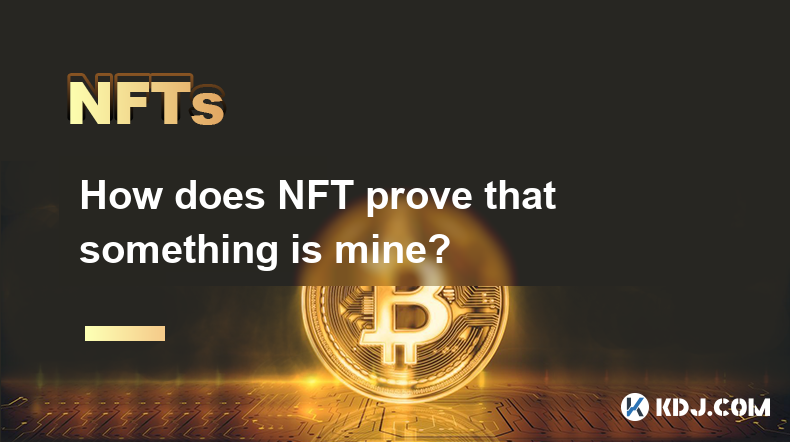
Non-fungible tokens (NFTs) have become a revolutionary way to prove ownership of digital assets in the cryptocurrency world. But how exactly do NFTs prove that something is yours? The answer lies in the unique characteristics of blockchain technology and the specific attributes of NFTs. In this article, we will explore the mechanisms behind NFTs that establish ownership, the role of blockchain in securing this ownership, and how these digital tokens can be used to verify that an asset belongs to you.
The Basics of NFTs and Ownership
At their core, NFTs are digital tokens that represent ownership of a unique item or piece of content, typically on the Ethereum blockchain. Unlike cryptocurrencies such as Bitcoin or Ethereum, which are fungible and can be exchanged on a one-to-one basis, NFTs are unique and cannot be exchanged on an equal footing. This uniqueness is what makes NFTs ideal for proving ownership of digital assets. When you purchase an NFT, you are essentially buying a token that is linked to a specific piece of content, whether it's a piece of art, a music file, or a virtual real estate plot.
How Blockchain Technology Secures Ownership
Blockchain technology plays a crucial role in securing the ownership of NFTs. Each NFT is recorded on a blockchain, which is a decentralized and immutable ledger of transactions. This means that once an NFT is minted and recorded on the blockchain, its ownership history is transparent and cannot be altered. The blockchain acts as a public record of who owns the NFT at any given time, providing a clear and verifiable proof of ownership. This transparency and immutability are what make NFTs a reliable way to prove that something is yours.
The Role of Smart Contracts in NFT Ownership
Smart contracts are another essential component of NFT ownership. These are self-executing contracts with the terms of the agreement directly written into code. When you purchase an NFT, the transaction is facilitated by a smart contract that automatically transfers ownership of the token to your wallet address. This process ensures that the transfer of ownership is secure and transparent. Smart contracts also allow for additional functionalities, such as royalties for creators, which can be automatically enforced every time the NFT is sold.
Unique Identifiers and Metadata
Each NFT contains a unique identifier and metadata that further establish its ownership. The unique identifier is a distinct code that differentiates one NFT from another, ensuring that no two NFTs are exactly the same. The metadata, on the other hand, includes information about the asset, such as its name, description, and any other relevant details. This metadata is stored on the blockchain alongside the NFT, providing a comprehensive record of the asset and its ownership. By examining the unique identifier and metadata, anyone can verify the authenticity and ownership of an NFT.
Verifying Ownership Through Wallet Addresses
Your wallet address is a critical link in proving NFT ownership. When you purchase an NFT, it is transferred to your wallet address, which is a unique string of characters associated with your cryptocurrency wallet. This wallet address serves as your digital identity in the blockchain world. By checking the blockchain, anyone can see which wallet address currently holds the NFT, thus verifying that you are the owner. This process is straightforward and can be done using various blockchain explorers or NFT marketplaces.
Public Records and Transparency
The transparency of blockchain technology is a significant advantage when it comes to proving NFT ownership. Since all transactions are recorded on the public ledger, anyone can access and verify the ownership history of an NFT. This public record ensures that there is no ambiguity about who owns the asset. If someone claims to own an NFT, you can easily check the blockchain to confirm whether their wallet address matches the one listed as the current owner of the token. This level of transparency is what makes NFTs a powerful tool for proving ownership.
Practical Examples of NFT Ownership
To illustrate how NFTs prove ownership, let's consider a few practical examples:
Art NFTs: When you purchase an NFT representing a piece of digital art, the token is linked to the artwork and stored in your wallet. Anyone can verify that you own the art by checking the blockchain.
Virtual Real Estate: In virtual worlds like Decentraland, NFTs represent ownership of virtual land plots. The blockchain records who owns each plot, making it clear and verifiable.
Collectibles: NFTs can represent digital collectibles, such as trading cards or in-game items. The ownership of these collectibles is recorded on the blockchain, ensuring that you can prove you own them.
Challenges and Limitations
While NFTs provide a robust way to prove ownership, there are some challenges and limitations to consider. For instance, the ownership of an NFT does not necessarily grant you copyright over the underlying asset. Additionally, the value of an NFT can be highly volatile, and the market for NFTs can be unpredictable. It's also important to be aware of potential scams and fraudulent activities in the NFT space. Despite these challenges, the core mechanism of using blockchain to prove ownership remains a powerful tool.
The Future of NFT Ownership
As the technology and adoption of NFTs continue to evolve, the ways in which they prove ownership are likely to become even more sophisticated. Innovations such as improved smart contract functionalities, enhanced metadata standards, and better user interfaces for verifying ownership could further solidify the role of NFTs in proving that something is yours. The future of NFT ownership looks promising, with potential applications extending beyond art and collectibles into areas like identity verification and digital rights management.
Common Questions About NFT Ownership
How do I know if an NFT is really mine?
You can verify the ownership of an NFT by checking the blockchain to see if the token is linked to your wallet address. Use a blockchain explorer or an NFT marketplace to confirm this.Can someone steal my NFT?
While the blockchain itself is secure, your NFT can be stolen if someone gains access to your wallet. It's crucial to use strong security measures, such as hardware wallets and two-factor authentication, to protect your assets.What happens if I lose my wallet's private key?
If you lose your private key, you will no longer be able to access your wallet and, consequently, your NFTs. It's essential to back up your private key securely.Can I sell my NFT to someone else?
Yes, you can sell your NFT to someone else through an NFT marketplace. The transaction will be recorded on the blockchain, transferring ownership to the buyer's wallet address.Do I own the copyright to the asset if I own the NFT?
Owning an NFT does not automatically grant you the copyright to the underlying asset. The rights to the asset depend on the terms set by the creator when the NFT was minted.How can I prove ownership of an NFT to someone else?
You can prove ownership by showing them the blockchain record of the NFT linked to your wallet address. This can be done using a blockchain explorer or an NFT marketplace.What if someone else claims to own my NFT?
If someone else claims to own your NFT, you can check the blockchain to see which wallet address currently holds the token. The blockchain's public record will show the true owner.Can NFTs be used for physical items?
While NFTs are primarily used for digital assets, they can also represent ownership of physical items. However, the physical item itself would need to be managed separately from the NFT.How do I transfer an NFT to another wallet?
To transfer an NFT to another wallet, you can use an NFT marketplace or a compatible wallet application. The process involves initiating a transaction that moves the NFT from your current wallet to the recipient's wallet address.What are the fees associated with NFT transactions?
NFT transactions typically involve gas fees, which are payments made to the blockchain network for processing the transaction. The fees can vary based on network congestion and the complexity of the transaction.
Disclaimer:info@kdj.com
The information provided is not trading advice. kdj.com does not assume any responsibility for any investments made based on the information provided in this article. Cryptocurrencies are highly volatile and it is highly recommended that you invest with caution after thorough research!
If you believe that the content used on this website infringes your copyright, please contact us immediately (info@kdj.com) and we will delete it promptly.
- Ethereum (ETH) Price Prediction: ETH Up for Rally As Buying Signal Flashes
- 2025-04-15 18:00:12
- XRP Price Prediction: Technical Analysis and Market Momentum
- 2025-04-15 18:00:12
- Toncoin (TON) Is in the Spotlight as Several On-Chain and Technical Indicators Suggest a Possible Rally
- 2025-04-15 17:55:15
- MAGACOINFINANCE – Viral Momentum With Real ROI
- 2025-04-15 17:55:15
- When Peter Brandt speaks, the markets listen. This trading veteran, active since the 1970s, dropped a bombshell
- 2025-04-15 17:55:13
- KiloEx, a decentralized exchange (DEX) for trading perpetual futures, was hit by a sophisticated attack
- 2025-04-15 17:55:13
Related knowledge
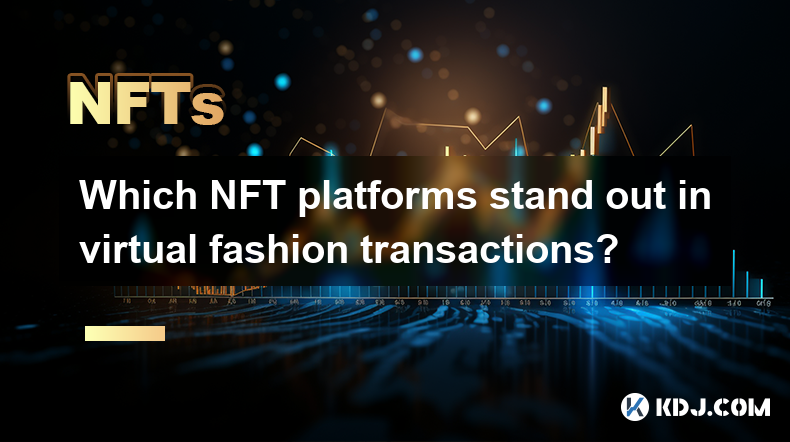
Which NFT platforms stand out in virtual fashion transactions?
Apr 15,2025 at 02:29am
In the dynamic world of cryptocurrency and digital assets, Non-Fungible Tokens (NFTs) have carved out a significant niche, particularly in the realm of virtual fashion. As the demand for unique digital wearables and accessories grows, several NFT platforms have emerged as leaders in facilitating these transactions. This article explores the standout NFT...
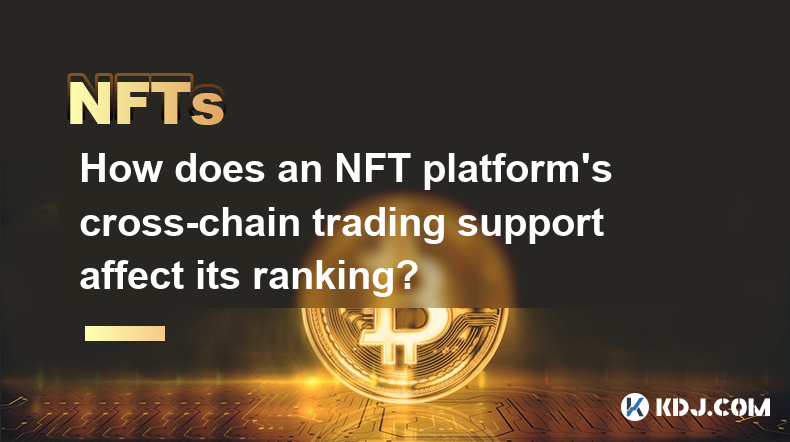
How does an NFT platform’s cross-chain trading support affect its ranking?
Apr 14,2025 at 04:49pm
The impact of an NFT platform's cross-chain trading support on its ranking is a multifaceted topic that delves into the technical capabilities, user experience, and market dynamics of the platform. Cross-chain trading refers to the ability of an NFT platform to facilitate the exchange of non-fungible tokens across different blockchain networks. This fea...
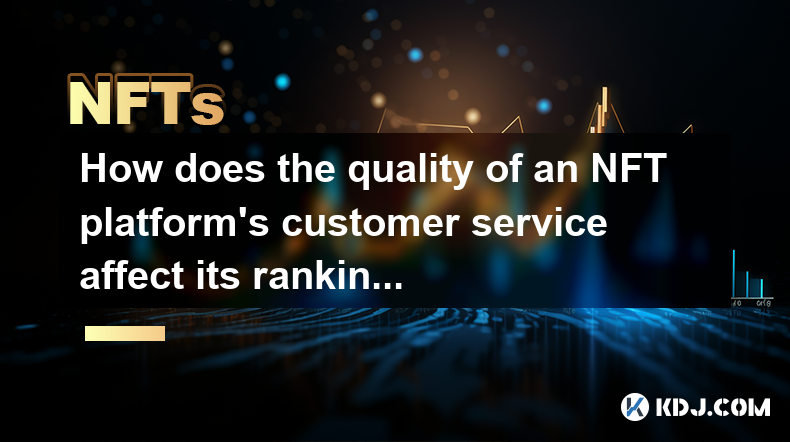
How does the quality of an NFT platform’s customer service affect its ranking?
Apr 15,2025 at 05:49am
The quality of an NFT platform's customer service plays a crucial role in determining its ranking within the competitive landscape of the cryptocurrency and NFT market. Customer service is often the bridge between a platform and its users, directly impacting user satisfaction, trust, and overall experience. This article delves into how different aspects...
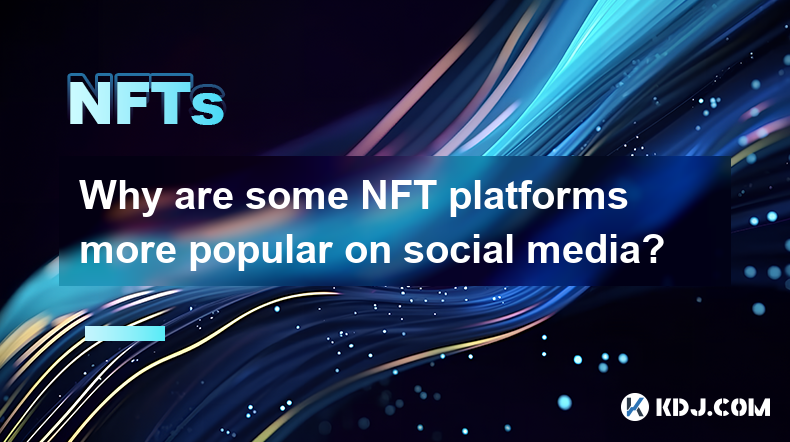
Why are some NFT platforms more popular on social media?
Apr 15,2025 at 01:00am
The popularity of NFT platforms on social media can be attributed to a variety of factors that influence their visibility, engagement, and overall appeal to users. Understanding these factors can provide insights into why certain platforms capture more attention and interaction on social media channels. User Experience and InterfaceUser experience (UX) ...
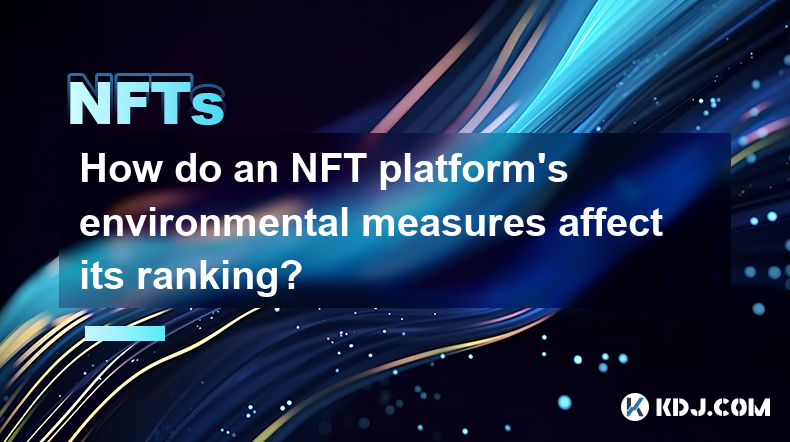
How do an NFT platform’s environmental measures affect its ranking?
Apr 15,2025 at 02:14am
The impact of an NFT platform's environmental measures on its ranking is a topic of growing importance within the cryptocurrency circle. As the digital art and collectibles market grows, so does the scrutiny over the environmental footprint of the blockchain technologies that support these platforms. This article will delve into how these environmental ...
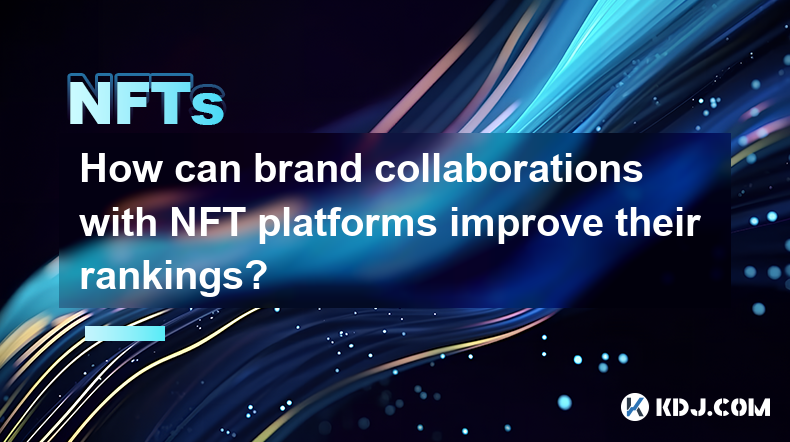
How can brand collaborations with NFT platforms improve their rankings?
Apr 15,2025 at 01:35am
Brand collaborations with NFT platforms have become increasingly popular in the cryptocurrency circle, offering a unique way to enhance visibility and rankings. By leveraging the strengths of both brands and NFT platforms, these collaborations can drive engagement, increase user base, and ultimately improve rankings on various metrics. In this article, ...

Which NFT platforms stand out in virtual fashion transactions?
Apr 15,2025 at 02:29am
In the dynamic world of cryptocurrency and digital assets, Non-Fungible Tokens (NFTs) have carved out a significant niche, particularly in the realm of virtual fashion. As the demand for unique digital wearables and accessories grows, several NFT platforms have emerged as leaders in facilitating these transactions. This article explores the standout NFT...

How does an NFT platform’s cross-chain trading support affect its ranking?
Apr 14,2025 at 04:49pm
The impact of an NFT platform's cross-chain trading support on its ranking is a multifaceted topic that delves into the technical capabilities, user experience, and market dynamics of the platform. Cross-chain trading refers to the ability of an NFT platform to facilitate the exchange of non-fungible tokens across different blockchain networks. This fea...

How does the quality of an NFT platform’s customer service affect its ranking?
Apr 15,2025 at 05:49am
The quality of an NFT platform's customer service plays a crucial role in determining its ranking within the competitive landscape of the cryptocurrency and NFT market. Customer service is often the bridge between a platform and its users, directly impacting user satisfaction, trust, and overall experience. This article delves into how different aspects...

Why are some NFT platforms more popular on social media?
Apr 15,2025 at 01:00am
The popularity of NFT platforms on social media can be attributed to a variety of factors that influence their visibility, engagement, and overall appeal to users. Understanding these factors can provide insights into why certain platforms capture more attention and interaction on social media channels. User Experience and InterfaceUser experience (UX) ...

How do an NFT platform’s environmental measures affect its ranking?
Apr 15,2025 at 02:14am
The impact of an NFT platform's environmental measures on its ranking is a topic of growing importance within the cryptocurrency circle. As the digital art and collectibles market grows, so does the scrutiny over the environmental footprint of the blockchain technologies that support these platforms. This article will delve into how these environmental ...

How can brand collaborations with NFT platforms improve their rankings?
Apr 15,2025 at 01:35am
Brand collaborations with NFT platforms have become increasingly popular in the cryptocurrency circle, offering a unique way to enhance visibility and rankings. By leveraging the strengths of both brands and NFT platforms, these collaborations can drive engagement, increase user base, and ultimately improve rankings on various metrics. In this article, ...
See all articles























































































